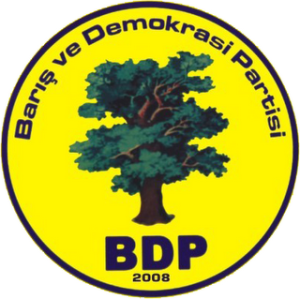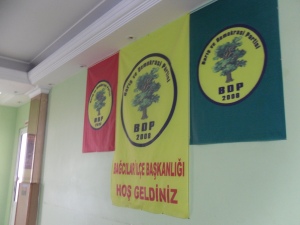by Jessica Shor
Bagcilar is at the end of Istanbul’s T1 tramline, 20 stops from our hotel in Sultanahmet, Istanbul’s tourist center. Wikipedia describes it as a working class suburb, known for its poor infrastructure, as well as a recent discovery that many families in the neighborhood fail to send their girls to school. With the Grand Bazaar and an endless number of mosques and side streets to explore, Bagcilar is on nobody’s list of top Istanbul destinations. I coaxed four other Glo-trippers to accompany me to Bagcilar one afternoon, however, because I was told it was one of Istanbul’s predominantly Kurdish neighborhoods.
I am researching Kurdish issues, and by going to Bagcilar, I hoped to get a feel for what a predominantly Kurdish area is like. I had no idea what to expect. I didn’t know whether it would look or feel different from the rest of Istanbul, whether I would be able to speak with anybody, or even whether the neighborhood was actually as Kurdish as people claimed it was. In the back of my mind, though, I did have an idea of what would make the trip to Bagcilar a true success: finding a BDP office.
The BDP (Peace and Democracy Party) is the latest of Turkey’s pro-Kurdish political parties. Over the years, all of its predecessors have been banned by the government, and the party is considered by many to be the political wing of the PKK (Kurdish Workers’ Party), which the EU, US, and Turkey have designated as a terrorist organization. At the very least, experts and Turkey-watchers claim a close, if informal, connection between the PKK and BDP. With general elections approaching on June 12, the BDP and PKK have assumed greater roles on the political stage. Turkey has banned 12 BDP candidates from running in the election, sparking mass riots, violence, and the threat of an all-out war by the PKK if the situation does not improve by June 15. In places like Diyarbakir, the southeastern city considered the capital of Turkish Kurdistan, the situation has become quite literally explosive.

So imagine my surprise and excitement when the five of us rounded a corner and spotted a yellow BDP sign on the side of a building. I had exchanged several emails with a BDP representative while in the US, but had never found the address or contact information for the party’s main Istanbul branch. Yet with a stroke of dumb luck, we found ourselves outside of an office. We exchanged excited glances and decided to check it out.
We climbed up the six flights of stairs of the office, marked BDP posters plastered to the walls. We knocked. And waited. And waited some more. Finally, as we were about to leave, a man opened the metal door and peered out at us, clearly surprised to find five foreigners staring back at him.
“BDP?” I asked, pointing at him.
“Yes,” he replied.
“English?” I asked, crossing my fingers for a nod.
He shook his head. I cringed. We, however, were not about to give up. I pointed inside, and he gave a slight nod. We were in. He offered us cay (tea), and we smiled eagerly. As soon as he left, we began frantically paging through the short glossaries in our Lonely Planet guidebooks for help. The man returned, armed with six cups of tea and two more men, and the “interview” began.
I turned on my tape recorder, pointed at the BDP poster behind us, and gestured as though I were speaking. Can you talk about the BDP? The man beside me smiled. I settled back into my chair satisfied, assuming he had understood my charade. I waited for him to start speaking.
“BDP!” the man said with a grin, “Kurdish! Yes, Kurdish. BDP Kurdish. Me Kurdish.”
I repeated my gesture. He repeated his answer. I changed my gesture. He repeated his answer. My companions and I exchanged hopeless glances and grabbed for the Lonely Planets.
“BDP why?” we managed. “PKK good? PKK why? PKK and BDP together?”
I motioned to the TV screen in the corner, which was showing photos of militants set to triumphant music. “Who?” “Guerrilla,” came the reply. “Turks,” he said, making a gun out of his thumb and index finger, shooting at himself then pretending to be dead. The people on the screen were martyrs, I realized; the Turkish military had killed them.

Armed with a small crack in the language barrier and a new set of tactics – writing down questions and handing over a pen for a written reply – we gained confidence. The “interview” was stilted, filled with awkward silences, frantic flipping through our language guide, and frustrated muttering under our breath, but we stayed for nearly an hour, drinking tea and attempting communication. By the time we left, we had forty-five minutes recorded on tape, handfuls of paper with written questions and answers, and a stack of BDP posters.
I have yet to translate the recording and writing, but the five of us immediately deemed the chance meeting a complete success. A visit to an unknown neighborhood on the outskirts of Istanbul became an afternoon tea with politicians who may or may not have ties to a militant separatist group. It was lucky, impromptu, and once-in-a-lifetime – everything the Globalist trip is about. Encounters like that are daily reminders of why the Globalist trip is such an invaluable experience. To send emails, speak over Skype, and conduct background research online are one type of reporting, but to stumble into a meeting, communicate without a common language, and come out feeling as though you better understand another group’s mindset is quite another.